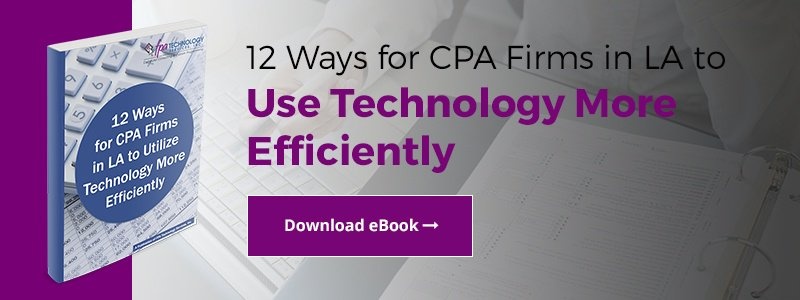 California has the unenviable ranking of second place for the top ten states most at risk for disasters. There have been seventy-nine major disasters in California since 1953 and the last major earthquake in Southern California wreaked havoc on the Los Angeles area in 1994.
California has the unenviable ranking of second place for the top ten states most at risk for disasters. There have been seventy-nine major disasters in California since 1953 and the last major earthquake in Southern California wreaked havoc on the Los Angeles area in 1994.
With these statistics and events in mind, it goes without saying that Los Angeles CPAs should have a sound IT disaster recovery plan in place. A natural, or man-made disaster for that matter, could cause a very costly data loss.
Your clients entrust your firm to protect their data from being hacked, lost, or destroyed. There are many precautions your firm should take to ensure this information can be recovered should a disaster strike.
Here are five best practices to make sure you are prepared to rescue your client’s critical information assets in case of a disaster.
1. Back It Up
It seems really obvious, however backing up your clients’ data is critical. In some cases, using online versions of accounting software will often be provisioned with automated backups by the service providers themselves. If you are using a desktop accounting application, finding a backup service, or portable local backup drive is highly advisable.
2. Lock It Down
Data encryption for data at rest and in motion reduces your risk of tampering. Having decryption keys in escrow to allow for unlocking of secured data provides you and your customer with confidence that data will be secure in the event of a disaster.
When the decryption key is sourced from the escrow provider, the data can be effectively recovered. In the chaos that follows a disaster, you don’t want to have any devices walk out the door with their accompanying data.
3. Establish Clear Plans
In the heat of the moment during a disaster, having a clearly documented set of data protection policies and procedures can mitigate your risk. Delegating responsibilities ahead of time can protect your systems before they are affected.
Having practice sessions where you simulate disasters, and ensure your plans are effective and clearly understood. You can leverage one of many IT disaster recovery plans which are available from trusted providers online.
4. Implement Recovery Sites for People and Data
Cloud accounting software which can be accessed from privileged employee home offices or other offsite locations can accelerate the process of getting your information assets back online and minimize the impact on your firm’s productivity.
Redundant data repositories and/or cloud systems can be synchronized, ensuring the integrity of the data in case one set of files gets corrupted. Check with your application provider for compatible services.
5. Evaluate Potential Threats
Once you have protocols and plans in place, consider the spectrum of disasters which can occur in your region and evaluate the viability of your plans against each scenario. Assemble a Disaster Recovery and Business Continuity committee for larger firms of interdepartmental leaders.
If there have been previous IT related disasters, or new ones, ensure records are kept of what worked, what didn’t, and document lessons learned for continuous improvement.
Los Angeles CPAs have to be vigilant to prepare for potential threats to their client’s information assets. Effective preparation, clear delegation of responsibilities, and secure encryption can be the difference between complete data loss and minimal disaster impact.
Have you experienced an IT disaster at your CPA firm? What sort of IT disaster recovery plan strategies did you have in place? Please share your thoughts in the section for Comments below.
And to follow-through on the tips introduced in this short article, be sure to download your free guide, 12 Ways for CPA Firms in LA to Utilize Technology More Efficiently.
/fpa-logo-tagline.gif)






